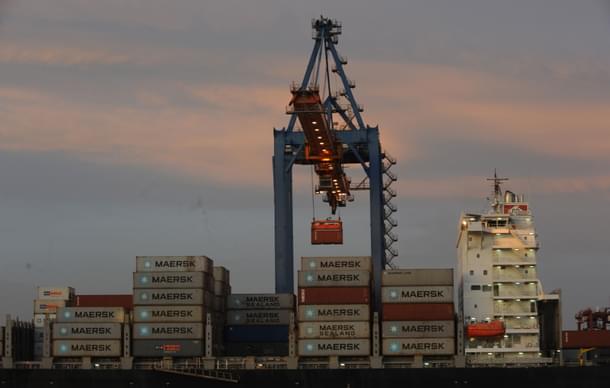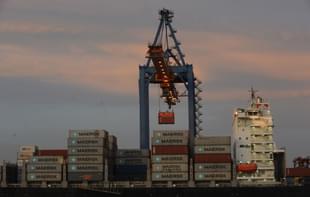Infrastructure
Shipping Ministry Targets 80 Per Cent Landlord Model At Major Ports By 2030
Swarajya Staff
May 20, 2024, 12:01 PM | Updated 12:20 PM IST
Save & read from anywhere!
Bookmark stories for easy access on any device or the Swarajya app.


The Shipping Ministry aims to transition to an 80 per cent landlord model by the end of this decade to enhance efficiency and reduce logistics costs at major ports.
Under this model, the port authority functions as a landlord and act as trade facilitator by investing in common user facilities like deepening of channels, improvements in connectivity, etc. leaving commercial services to private entities.
The landlord port, in return, gets a share of the revenue from the private entity.
Speaking at the CII Annual Business Summit 2024, Ports, Shipping, and Waterways Secretary TK Ramachandran highlighted that Jawaharlal Nehru Port (JNPT) has become the country's first major port to fully adopt the landlord model, with all berths operated under the PPP (public-private partnership) model.
"We have 12 major ports with significant capacity. Our goal is to shift to an 80 per cent landlord model by the end of this decade," Ramachandran stated.
Approximately 95 per cent of India’s trade by volume and 68 per cent by value are moved through maritime transport facilitated by 229 ports (12 major and 217 minor ports) along its 7,517 km coastline.
The 12 major ports — Deendayal (Kandla), Mumbai, Mormugao, New Mangalore, Cochin, Chennai, Ennore (Kamarajar), Tuticorin (V O Chidambaranar), Visakhapatnam, Paradip and Kolkata (including Haldia) and Jawaharlal Nehru Port — are under the administrative control of the Ministry of Shipping, and are regulated under Major Ports Authority Act, 2021.
However, ports other than major ports (non-major or minor ports) and their concessionaires are regulated by state maritime boards under the respective state governments.
The Centre's recent embrace of this global model has drawn criticism from Adani Ports, controlled by Gautam Adani. Adani Ports stated that it has replaced the landlord model at its ports with a "service-driven approach."
"Earlier, ports were owned by one company who farmed out services to vendors. APSEZ walked the road less travelled; it selected to own all services. This did two things: it established control and empowered the company to provide an integrated solution. The company has emerged as a holistic port cum logistics service provider, graduating from what could have been a one-off transaction into an enduring relationship,” the company stated in its Annual Report for FY 22-23.
The report noted that in most global landlord ports, terminals are operated by private players while key infrastructure and services are provided by the port authority. This often results in inefficient communication and service flow among various port stakeholders.
"At APSEZ ports, all these facilities/services such as pilotage, stevedoring, yard management, receipt and dispatch of cargo, dredging amongst other services, are being offered by a single operator (APSEZ), resulting in a superior service standard, customer retention and margins,” the report explained, highlighting the advantages of their port-plus model.
This approach has enabled better control over operations and empowered the company to deliver an improved customer experience and higher margins.





